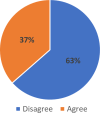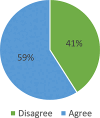Determinants of men's perspectives on women contraceptive use in Ghana: an analysis of the 2022 Ghana demographic and health survey
- PMID: 39049061
- PMCID: PMC11271215
- DOI: 10.1186/s40834-024-00300-z
Determinants of men's perspectives on women contraceptive use in Ghana: an analysis of the 2022 Ghana demographic and health survey
Abstract
Background: Male dominance in reproductive health decision-making, specifically regarding family planning and contraceptive use among women, has been argued to have a significant influence on Africa's fertility transition. However, there is a paucity of research evidence on the extent to which men influence contraceptive adoption and the factors shaping their perspectives on contraceptive use among women in Ghana. This study aims to examine the factors influencing men's perspectives on women's contraceptive use in Ghana.
Methods: Data for this study was obtained from the 2022 Ghana Demographic and Health Survey (GDHS) conducted between October 17, 2022 and January 14, 2023. A total weighted sample of 7,044 men aged 15-59 was extracted from the men's data file. Data was analyzed with SPSS version 27, employing both descriptive and binary logistics regression modeling. Statistical significance was set at p < 0.05.
Results: The results indicate that 63% of men disagreed with the opinion that contraception is solely a woman's concern, while 59% agreed with the view that contraceptive use encourages promiscuity among women. With factors that significantly influence men's opinion on contraception being solely a woman's concern, men with secondary (aOR = 0.69; C.I: 0.57-0.82) and higher education, residing in urban areas, belonging to other Christian faiths, Ga/Dangme, Ewe, and Mole-Dagbani men were less likely to agree with such opinions. Conversely, men dwelling in the Coastal zones were more likely to agree with that view. Men exposure to FP messages on radio and during community durbars had higher odds of agreeing with that opinion. Regarding the factors influencing men's perspective on the perception that contraceptive use by women encourages promiscuity, men who are 20-24 (aOR = 1.51; C.I:1.12-2.03) and 35-39 years in Coastal and Middle Belt zones, cohabiting and formerly married men were more likely to agree with such opinions. Conversely, men with higher educational levels, in urban areas and unemployed had lower odds to agreeing with such perception.
Conclusions: The study underscores the importance of men's socio-demographic characteristics and their exposure to FP messages in shaping their perspectives on women's contraceptive use. Policy implications highlight the need to involve men in promoting safe sexual and reproductive health practices.
Keywords: Contraception; Ghana; Male perspectives; Women.
© 2024. The Author(s).
Conflict of interest statement
The authors declare no competing interests.
Figures
Similar articles
-
The power of women's and men's Social Networks to catalyse normative and behavioural change: evaluation of an intervention addressing Unmet need for Family Planning in Benin.BMC Public Health. 2022 Apr 7;22(1):672. doi: 10.1186/s12889-022-12681-4. BMC Public Health. 2022. PMID: 35392862 Free PMC article.
-
Women's fears and men's anxieties: the impact of family planning on gender relations in northern Ghana.Stud Fam Plann. 1999 Mar;30(1):54-66. doi: 10.1111/j.1728-4465.1999.00054.x. Stud Fam Plann. 1999. PMID: 10216896
-
Ethnicity and contraceptive use in sub-Saharan Africa: the case of Ghana.J Biosoc Sci. 1999 Jan;31(1):105-20. doi: 10.1017/s0021932099001054. J Biosoc Sci. 1999. PMID: 10081241
-
Factors that determine prevalence of use of contraceptive methods for men.Stud Fam Plann. 1993 Mar-Apr;24(2):87-99. Stud Fam Plann. 1993. PMID: 8511809 Review.
-
Canadian Contraception Consensus (Part 1 of 4).J Obstet Gynaecol Can. 2015 Oct;37(10):936-42. doi: 10.1016/s1701-2163(16)30033-0. J Obstet Gynaecol Can. 2015. PMID: 26606712 English, French.
References
-
- Nieschlag E. Male contribution to contraception. In Andrology: male reproductive health and dysfunction 2023 Oct 27 (pp. 761–7). Cham: Springer International Publishing.
-
- Greene ME. Changing women and avoiding men: gender stereotypes and reproductive health programmes. IDS Bull Inst Deve Stud. 2000;31(2):49–59.10.1111/j.1759-5436.2000.mp31002007.x - DOI
-
- Oyediran K, Isiugo-Abanihe U. Husband-wife communication and couple’s fertility desires among the Yoruba of Nigeria. Afr Pop Stud. 2002;17:61–80.
-
- Fincher RA. International conference on population and development. Envtl. Pol’y & L. 1994;24:309.
LinkOut - more resources
Full Text Sources



